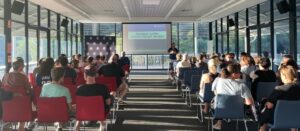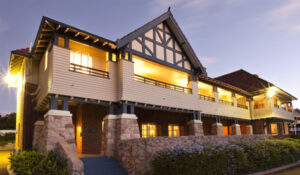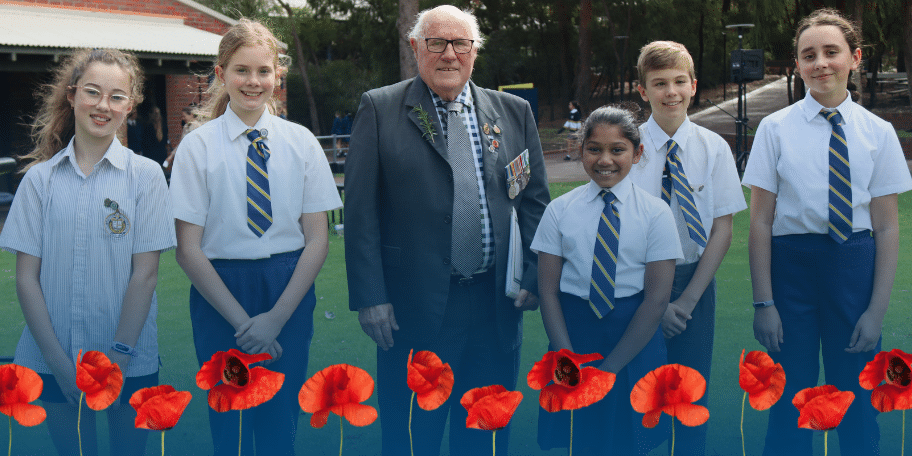Our School was joined by special guest, Bunbury RSL member, Mr Terrance Barker, who is also a past parent of the School for the whole school ANZAC memorial service. 2023 marks the 50 Year Anniversary of Australia’s withdrawal from Vietnam. Mr Barker recounted his personal story of being conscripted to the Army for the Vietnam war and outlined the journey he took as a 19 Year old, from Donnybrook, to Vietnam and back.
This year we are commemorating the 50th anniversary of the end of Australia’s involvement in the Vietnam War. This was one of Australia’s longest commitments in a war, starting in 1962 until Australia withdrew its troops in 1973. Some 60,000 Australian Defence personnel served across the three services- Army, Navy and Airforce.
Once the Commonwealth government committed Australian forces to the conflict in Vietnam, they faced a major problem- the armed forces were not large enough for this conflict so they required a way to boost the size of the Army.
Conscription is the compulsory military service of young men (at this time gender equality didn’t exist!). The Government could not introduce conscription without a referendum – which they did not want to do. To get around this dilemma, it was decided to call Australian involvement a ‘police action’ not a war, so no referendum was required. Our leaders a the time, thought this solved the problem, but it was a very unpopular decision with the Australian people and contributed to social and political dissent both then and for many years to come.
Conscription in Australia enforced young men to register for national service when they turned 19. Boys were selected by a lottery, with marbles that had a number on them, drawn from a large barrel. If the number on the marble was your birth date, you were conscripted for two years of National Service, providing you passed the medical and mental tests.
I would like to tell you how a young, 19-year-old boy wound up as a conscripted solider for the war in Vietnam.
He was born in 1947 and lived on a farm in Donnybrook with his father, mother, two older brothers and a twin sister. He was educated at Donnybrook Junior High school, left school at 15 and moved to Perth to do a five-year apprenticeship as a motor mechanic.
When he turned 19, he had to register for National Service to comply with the law at that time. His birth date number must have come up because he received notification that he must attend a medical examination and mental test to decide his suitability for National Service.
He passed and was conscripted into the Army. His entrance was delayed by six months so he could finish his apprenticeship.
The day came for him to report to Karrakatta Army Barracks with all the other boys in that callup. They were given a quick medical and a feed, then headed to the airport to say good bye to family and loved ones. They flew to Victoria on an overnight flight that landed at Seymore, and then were trucked to Puckapunyal Army Base to complete basic training.
The young boy was allocated to D Company with others from all over Australia and became part of the 11th National Service intake. They all completed 10 weeks basic training, before being allocated to different Army corps. This young man became an engineer for the time he was in National Service.
All the boys allocated to engineers departed Puckapunyal and headed to the school of Military Engineering Training centre in Casula, south of Sydney. They were taught the basic of mines, explosives, tunneling, ropes, boats – things they needed to know to be engineers. After that came a plant operator course which finished his core training. His unit posting came through and he was sent to 1 Field Squadron Royal Australian Engineers based at Nui Oat, Vietnam. He then completed three weeks of jungle and fitness training at the Jungle Training Centre in Canungra, Queensland.
He then flew home to Perth, via Sydney, where he spent a week saying farewell to family and friends. He returned to Sydney and departed at night on a Qantas flight to Vietnam. He and the other troops bound for Nui Oat were loaded onto a military aircraft, flown to the Nui Oat base, then taken to 1 Field Head Quarters to be introduced to the unit. The unit had great news – the last thing they needed was Plant Operators! This young man was sent to headquarters transport, to be a driver and transporter of other field troops.
At that time, Australia had responsibility for operations in a province called Phuoc Tuy. There were two bases, one in the coastal town called Vung Tau and an inland base at a hill call Nui Oat. He drove trucks all over Phuoc Tuy Province for 10 months, carting equipment for fire support bases, completing road works with the local people and transporting troops to and from Vung Tau, quite often without protection – what a strange situation in a war zone!
He had lots of contact with the Vietnamese people. They were all good people but you never had any way of knowing which side they supported – creating a very confusing situation.
After his two years of service, he left Vietnam a very confused boy. Nothing he had been told in Australia made sense any more – what was it all about? Was his time wasted?
Arriving very late at night in Sydney, he waited around for his flight to Perth, and was met by a very happy mother.
He was home at last but faced by a country mired in anti-Vietnam protests which went on with increase hostility until the end of Australian involvement in the conflict in 1973.
The war was over. It was time to return to normal life, but alas, this young man could not shake the experience that conscription and war had on him and it made his life and family life very hard at times. War has always had a lasting effect on the lives of those who fought in them. The Vietnam War cost over 500 Australian lives including conscripts. Many more men and women arrived home with ongoing physical and mental health problems.
So today, we honour the values that have been invested in the original ANZACs – loyalty, selflessness and courage. Today, we acknowledge and pay our respects to all those Service men and women of Australia who have paid the ultimate price for our Ccuntry.
Mr Terrance Barker :: Vietnam Veteran and Bunbury RSL Member





